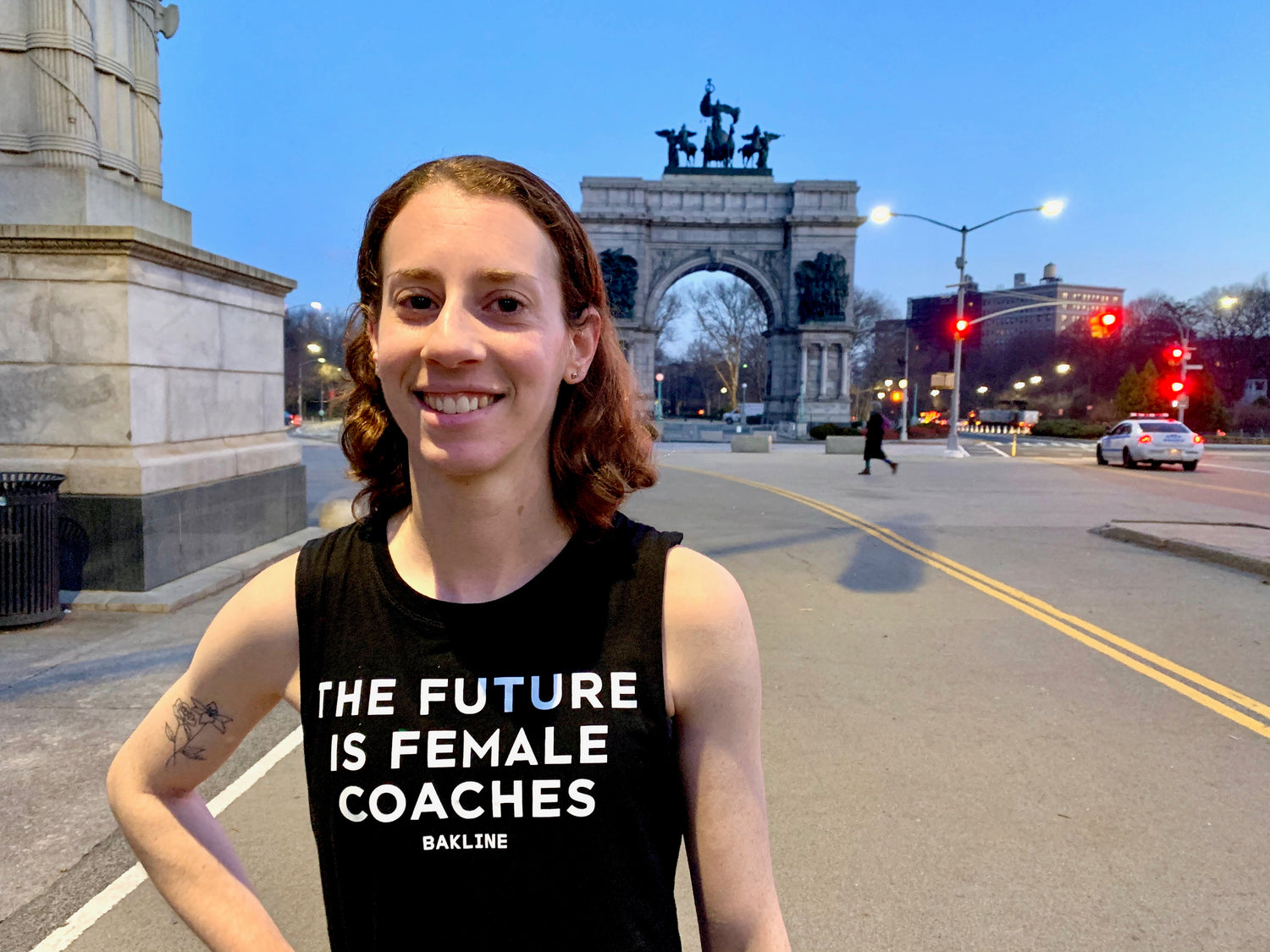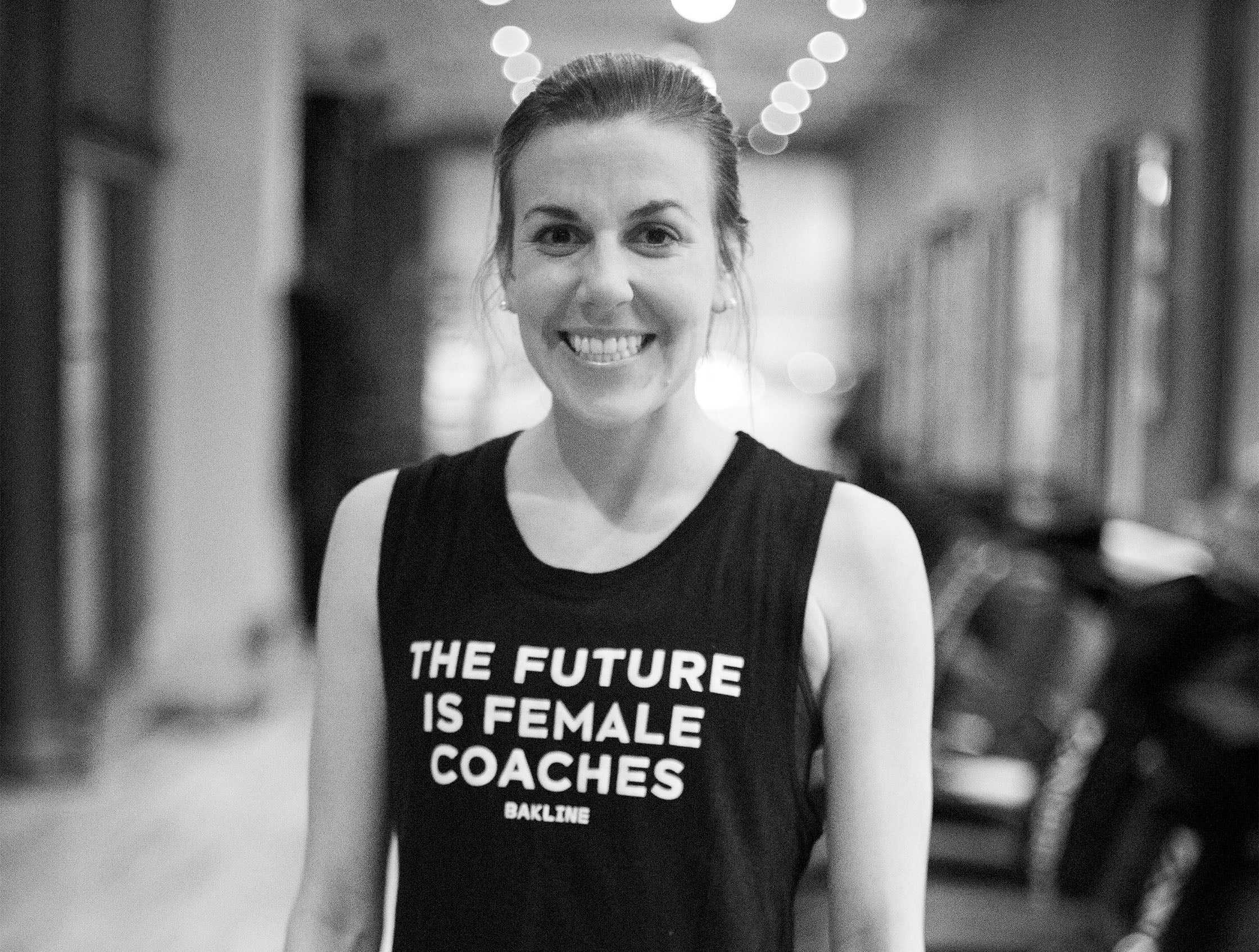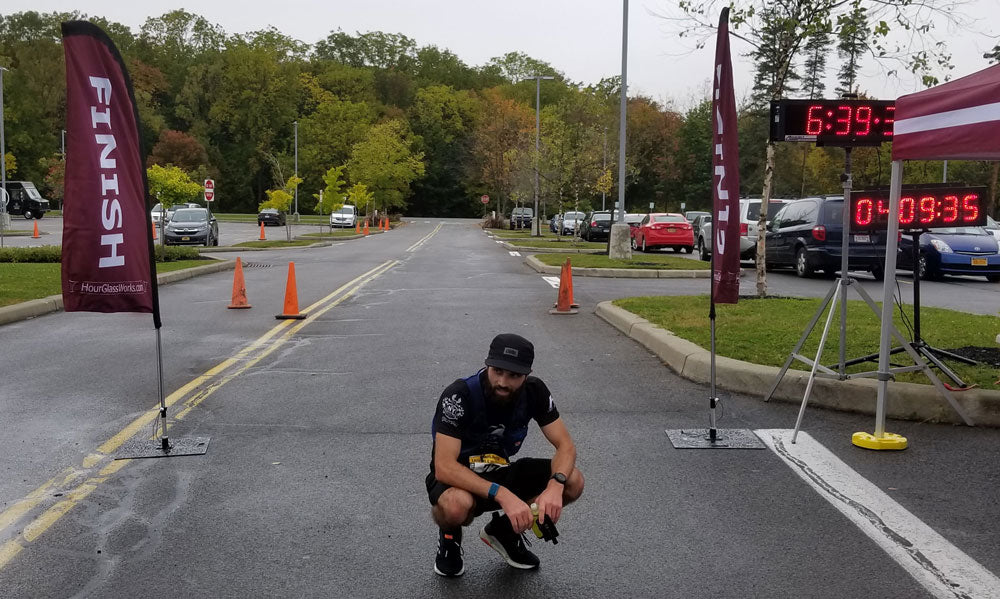In The Future is Female Coaches series, we’re celebrating the women of our sport who are leading, inspiring, and making us all stronger. Every week we’ll be featuring interviews with female coaches and leaders in the sport about their experiences and insights working across a variety of aspects and disciplines within the running space. We want to get the perspective of women working with youth sports and adult clubs, to highlight coaches training recreational and competitive runners, and hear stories from tracks, roads, and trails.
This week we’ve interviewed Jana Trenk, a director on the board of Prospect Park Track Club, one of the oldest running clubs in New York City. You can follow Jana on Strava at https://www.strava.com/athletes/7390620 and on Instagram at @janjanjana, and for more information on PPTC, check out https://pptc.org.
Athletic History & Experience:
I started running in 2001. I ran Cross Country and Track for Scarsdale High School and Fordham University. I currently run for Prospect Park Track Club in Brooklyn, NY. I recently ran 2:55:18 in the 2019 Philadelphia Marathon.
Current Athletic/Running Interests:
I’m currently focused on the road marathon. I’m a bit obsessed with it and think there’s nothing quite like it.
Current Leadership Role:
I’m a Director on the Board for Prospect Park Track Club and a member of our Social Committee.
How did you get your start in the sport? How have your involvement and interests changed over time?
My dad started running when he turned 40 years old to get back in shape. He joined a local running club, Westchester Track Club, and began training with a goal of running a sub-3 marathon. Every day, he woke up early in the morning to run before working long hours at his job in finance. I was so inspired seeing his dedication and sense of discipline. I was in middle school at the time and wanted to be like my dad, so I started running with him. We both love long runs and would go out on trails in Westchester, running as far as we could until I got too exhausted to go any further. I later ran Cross Country and Track for Scarsdale High School and then for Fordham University.
A few years after graduating college, I moved to Brooklyn. I had been feeling a bit burned out and uninspired to run at the time, but I joined Prospect Park Track Club and ended up meeting many new training partners who helped to reignite my love of the sport. I learned a lot about marathon training from books, podcasts, and talking to teammates about their training and the reasoning behind what they were doing. I started training for marathons and became more and more excited about it as I saw myself improving. In the 2018 NYC Marathon, I qualified to run in the race’s sub elite field and finished in 2:59:48. After that, I got curious about how good I could get in the marathon and decided I would work on training with an increased effort I finished the 2019 Philadelphia Marathon in 2:55:18 and felt great. I’m psyched to continue working and see how much more I can improve. I think that I always had a love of long distance running, but it wasn’t until the past few years that I had the desire to truly focus on the more specific aspects of training.

Photo credit @andrewlichtenstein
What has kept you engaged over the years?
I’ve met some of my closest friends through running, and am always excited when I go on a great run with someone new who I connect with. There’s no bond quite like the bond between training partners. It’s easy to have an open and honest conversation about all sorts of topics while running lots of miles. When you train with people you eventually find out each other’s whole life story, what they eat for breakfast, their bathroom habits, and the problems they had in their last relationship.
Prospect Park Track Club is a real close knit community—I live near the park and can’t go outside my apartment without seeing someone I know from the club. It’s easy to text teammates to meet up for a run at any time of day or night and any pace.
Training partners help make the daily miles fly by, provide encouragement when things don’t go well, and are there to celebrate with when goals are achieved.
Did you have any female coaches in your athletic history? Did that change your experience in any way?
I never had a female coach! The conversation that Mary Cain helped to spark recently is very important regarding body image/weight and lack of female coaches in the sport. We need more female coaches in the sport who understand girls’ and women’s bodies.
In the last decade we’ve seen professional female runners compete at the highest level later in their careers, and with that success they’re bringing a more mature perspective to the sport. As someone who has run competitively since high school, do you find that the way you’ve framed or pursued your goals has changed in that time?
I’m more patient now and don’t expect to achieve my goals instantly. I used to get upset if a workout or race didn’t go well—now I try to analyze it and think about what I need to work on without getting discouraged. It’s ok to feel disappointed when things don’t go how you want, but it’s important to be able to move on from that and continue training.
My number one goal is to be healthy and running for life. Since I’ve been running for so many years, I really prioritize rest and recovery. In high school and college I raced frequently, but now I pick and choose my races carefully and always take some time off completely from running after a goal race. I also love having one day off from running each week. My friends kind of make fun of me for it because I talk about how much I love the day off so much. I find that I train pretty hard when “on”, so I really need that “off” time to balance it out.
What advice would you give your high school runner self?
I’d tell high school Jana to focus on herself and not compare herself to others so much. There will always be someone ahead and someone behind, but the real race is with yourself. Just try to be the best runner (and person) you can be.
What inspired you to take on a leadership role in PPTC?
I was inspired to become involved in club leadership because I had a lot of ideas for programs and improvements in the club. I wanted to be in a role where I could work to implement these ideas. My general goal is to continue to make PPTC a more fun, more supportive and better community for our members.
What is your training philosophy?
I’m a really process oriented person. It’s important to find enjoyment in daily training and recognize the incremental progress you see. I don’t like getting too caught up in a specific number as a goal time before starting a training cycle. I’d rather train the smartest that I can and determine my goals closer to race day, using my training as an indicator. Training can be a grind (especially with higher mileage) and it’s not going to feel fun every minute. But if you have a genuine love for the sport and passion for what you’re doing, it’s very rewarding and definitely worth it.
PPTC is a large club with a membership that includes athletes with a wide range of goals and experience. How do you foster a club culture that feels welcoming and supportive for all your athletes?
Since we are a large club, we are able to have various groups focused on different goals. We have a group in the club training for 5k and another group training for ultramarathon. We have a group of “slow and steady” runners, and we have plenty of people like me who are training more competitively for road marathons. There truly is something for everyone in this club, and members who get involved and attend events will find their crew of like-minded people to train and spend time with.
As a Director on the Board and a member of PPTC’s Social Committee, I work very hard to provide programs and events that are inclusive to people of all paces and ages. A year ago, I came up with the idea of having a monthly pub run. Now on the last Wednesday of every month, we have an evening group run which is a loop of the park, ending at a local bar. Having the post-run meetup at the bar allows everyone to reunite and hang out regardless of what pace they run at. We always encourage members who are injured or not currently training to join us at the bar as well. This is a nice way for members to meet and chat with people who they wouldn’t necessarily train with. We also have other events focused on socializing such as post race brunches and celebrations, fun runs such as Pajama Run and Pi Day Run, and a yearly holiday party.
What areas of the sport have most evolved or improved for women in the time you’ve been involved?
I think people are just beginning to understand what female runners are capable of, especially women in their late 30s, into their 40s and beyond, and women who are mothers. Historically, there’s been a bias against women as we age. I love reading individual stories about the 2020 Olympic Trials Marathon qualifiers. Women such as Molly Friel who qualified at age 50 show what is possible.
What’s the most important area of growth or change you’d like to see for the future of female running?
A male teammate once told me that a PR I had (at the time) was already so fast and he was incredulous that I could get any faster. I think some men are still surprised that women can run competitively, and sometimes even run faster than they can. It’s time for men to stop being surprised that women can run somewhat fast and start believing that we have the potential to run even faster.



